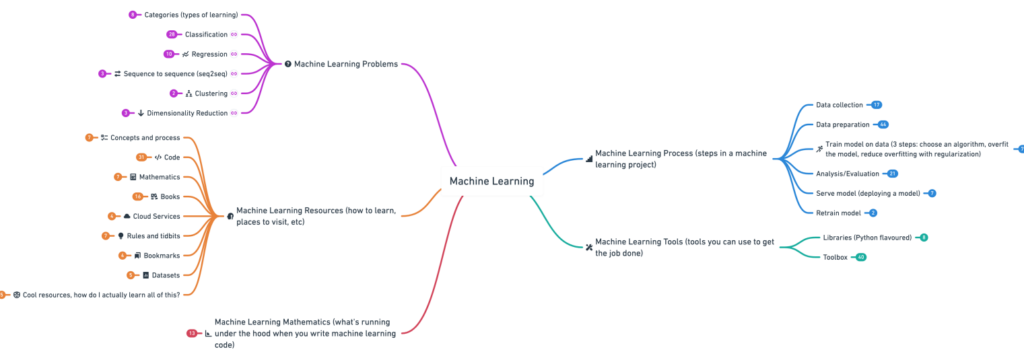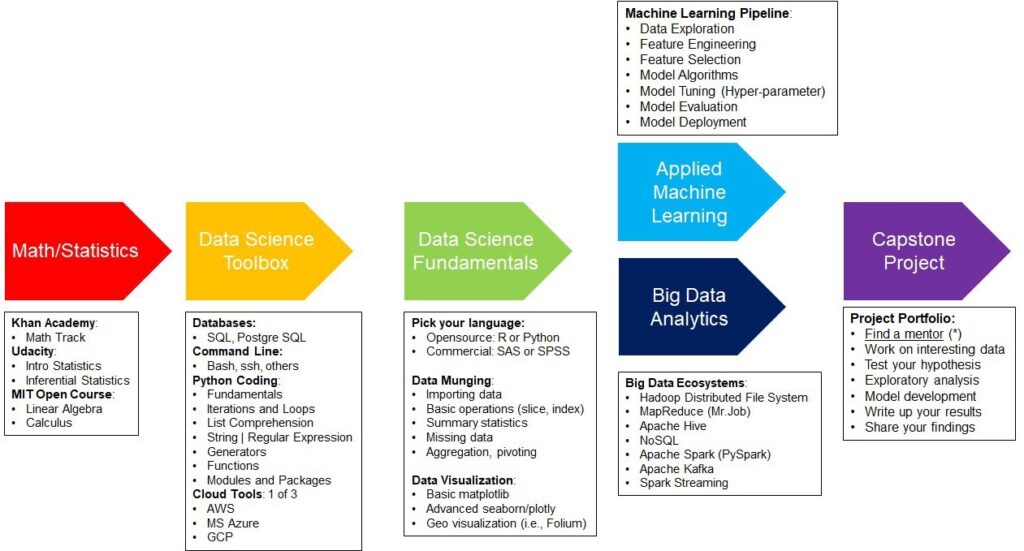
We can all unanimously accept that education is the key to the progress and development of human society. And, at the same time, such stellar progress opened up new avenues of learning and education. In simple words, education helped enhance our capabilities and we, in turn, employed augmentations to educate & strengthen ourselves better. As a result, education in the 21st century has advanced exponentially, and research & developments in academic institutions are shining examples of the immense potential of the human mind & spirit.
Higher education prospects have become abundant thanks to advancements in educational systems, pedagogical techniques, and last but not least, technology. STEM higher education endeavors have become trendy academic career options, given their high professional demand and excellent prospects
This article explores two of the most in-demand higher education courses of 2021- Artificial Intelligence and Data Science!
Let’s begin right away.
AI and Machine Learning: The Rising Giant
The AI and machine learning industries are projected to be worth around $31 billion by 2024. As a result, there is immense demand for talent across different industries, and millions worldwide are looking to carve a career in the domain for its diverse opportunities.
Educational options in AI and machine learning are in vast abundance for beginners. From free machine learning crash courses developed by Google to top-notch course materials from university professors in Massachusetts Institute of Technology’s Open Courseware and courses & professional certificates on MOOCs such as edX, there are a plethora of options for kick-starting a career in AI and machine learning.
Here’s a list of some excellent educational resources to get started with machine learning & AI.
- MIT OCW classes & materials
- Andrew NG’s Machine Learning course on Coursera
- Several free and paid courses & certificate programs on MOOCs like Udemy, edX
- Datasets on Kaggle.com
- Python for Data Science & Machine Learning Bootcamp on Udemy
- Microsoft’s Professional Program For AI
- Microsoft’s Cognitive Toolkit
- A plethora of books on the subject such as Paradigms of Artificial Intelligence Programming, Hands-On Machine Learning with Scikit-Learn and TensorFlow, An Introduction to Statistical Learning, Neural Networks and Deep Learning, and many more.
The following universities offer full-time courses with specializations in AI and machine learning.
- Massachusetts Institute of Technology
- Harvard University
- Stanford University
- University of California, Berkeley
- Carnegie Mellon University
- Yale University
- Texas University
- California Institute of Technology
AI and Machine Learning is a rising domain with excellent career prospects. The subject is, however, significantly challenging. Courses and professional programs are generally self-paced but require diligence, dedication, and effective time management. In addition, graded assignments and assessments can seem challenging if the courses are not appropriately followed.
Looking for math and computer science assignment help may be helpful but might reduce the effectiveness of your course.
Prerequisites
Specific prerequisites are a must, starting with a solid base in mathematics, statistics, computer programming, and computational thinking. More specialized & niche sub-domains require much more specific knowledge.
The skill-sets of an AI and ML aspirant can be summed up briefly as follows:
- Statistical Skills
The majority of machine learning and deep learning algorithms & techniques employ statistical methods such as linear regression and-d statistical learning theory to analyze & extract insights from data.
A thorough understanding of statistics and probability is necessary if one intends to design models which can analyze & find patterns in datasets.
- Mathematics & Probability
Linear algebra, set theory, calculus, quadratic equation solver and probability play vital roles in the design of algorithms that mine & discover knowledge from data sources. Current AI & machine learning models are heavily based on mathematical & statistical procedures.
Probability allows models to consider unpredictability; linear algebra helps in data representation; calculus highlights relationships between variables while statistics unearths the features & behaviors of data under question.
- Programming Skills
Besides mathematics assignment help, solid programming skills are another primary prerequisite. Python and R remain two of the most popular programming languages used in machine learning.
Besides these two, C++, Java, Lisp, Julia and Scala find widespread usage practitioners of the discipline.
- Data Structures, Databases, and Data Engineering
Fluency in these subjects will be a considerable advantage for ML aspirants.
Data lies at the heart of all ML and AI operations, and models train on massive data sets to discover insightful knowledge from them. Thus, possessing solid ideas about data collection, cleaning, and manipulation can be an enormous advantage.
- Distributed Computing
AI and Ml processes involve intensive computation. Large, heterogeneous, and complicated data sets are applied, which require massive resources for fast analysis. Cloud, cluster and distributed computing come into play in such cases, and knowledge in the field can help any ML practitioner.
Projects and applications play another crucial role. Capstone projects involve designing, training, and implementing your very own AI models. Such projects are an aspirant’s first steps towards engineering effective ML applications and carry a massive weight during interviews.
(One key thing to remember is that machine learning is just one particular avenue to create AI. Fuzzy logic, Expert Systems, Natural Language Processing, Robotics, etc. are few other avenues of achieving AI systems)
Education opportunities in AI are increasing at a fast pace as the demand rises and technologies evolve further. But, aspirants must remember that AI, Machine Learning, Deep Learning, and associated fields are pretty challenging and require diligent & focused effort.
We conclude this section with a comprehensive ML road map out there by Daniel Bourke, a leading ML engineer.

For a much more comprehensive & interactive version, here’s the link.
Next up, we look at the different academic opportunities available for those aspiring to be data scientists & data analysts.
Data Science: The Science Behind The Information Age
Data science is yet another stellar discipline in colossal demand across sectors as diverse as e-retail and meteorology.
Data science plays a central role in data analytics, big data, business intelligence, and any domain that’s heavily dependent on large-scale automated data analysis. Data is all around us, and businesses across all sectors are slowly but surely realizing how precious a treasure trove their databases & datasets are. Data scientists, data analysts, and data engineers are in high demand across numerous sectors, making data science & analytics an extremely affluent career path.
Just like AI and machine learning, numerous educational options are available for aspiring data scientists. Here’s a quick rundown of the many courses & programs available currently, starting with the most popular courses & programs on MOOC platforms
- edX.org’s Data Science courses, Micro-Masters programs, and professional certificate courses
- Great Learning’s PG program in Data Science and Business Analytics with UT Austin
- Coursera’s online Data Science & Analytics courses and professional certificate programs
- Simplilearn’s Data Scientist and Analyst courses & post-graduate programs
Besides the above self-paced online learning courses, several higher education institutions offer full-time undergraduate & post-graduate courses in data science & analytics.
- University of California, Berkeley
- MIT
- Carnegie Mellon University
- Stanford University
- University of Michigan, Ann Arbor
- University of Washington, Seattle
- University of Illinois
- Columbia University
- Cornell University
- University of Texas, Austin
Besides all the above approaches, many free resources are available online, ranging from e-books & research papers to free mini-courses.
GitHub, Kaggle, academic & university channels on YouTube, MIT-OCW, Harvard Online Learning are some of the best online resources for learners interested in self-study.
Necessary Skill-Sets
In general, data scientists and analysts need to possess a mix of solid mathematical skills, strong statistical skills, and decent programming knowledge. The necessity of programming arises from the need to manipulate gigantic databases & data warehouses. Math and stat skills are a must to scour through data and extract valuable information. No matter what option or path you choose to become a data scientist, developing specific skills is a must for attaining long-running success in the field.
Below are brief descriptions of the most vital skills for any data scientist.
- Statistics Fundamentals
Having a solid grasp of rudimentary and, if possible, advanced statistics is a must. Statistical analysis and learning methods lie behind almost every data analysis technique. Analysis, interpretation, transformation, visualization, organization, and presentation of different types and scales of data play a central role in knowledge discovery from data.
From descriptive to inferential statistics based on probability theory, these concepts are central to data science.
- Programming Acumen
Analyzing petabytes of data in massive data warehouses is next to impossible without automation. Automation is the next big thing. Machine learning, robotics & process automation is the most prominent avenues to achieving automation.
Computer programming and software engineering form the basis of any automation architecture. Therefore, data scientists require solid programming knowledge in two of the most prolific coding languages in the field- R & Python.
- Data Extraction, Transformation & Loading (ETL)
Extraction, transformation, and loading form the generic process involved in collecting and manipulating data from varied sources.
Extracting data from different sources, transforming extracted & collated data into an appropriate format and loading cleaned data into data warehouses for analysis require data scientists to possess solid ideas about all the procedures involved.
- Data Wrangling & Data Exploration
Data scientists need to scour through and analyze massive amounts of both structured & unstructured data. Data in warehouses are generally inconsistent and heterogeneous.
Wrangling and analyzing large datasets are crucial to making sense of all the different kinds of data and putting it to good use.
- AI and Machine Learning
Data science, AI, and machine learning are closely related to one another. Statistical methods & techniques used in data science are implemented in machine learning to create a system that showcases behaviors typical of artificial intelligence.
Machine learning is just one method of crafting AI, and data science play a crucial role. ML and its branches are subsets of data science, and learning AI & ML are central to any data science education program.
- Big Data Processing Framework
Vast amounts of data need to be wrangled and manipulated across all data science applications. Whether in data analytics or business intelligence, distributed computing & big data processing come into play anytime massive heterogeneous datasets comprising both structured & unstructured data.
Frameworks such as Hadoop and Spark allow data scientists to work on Big Data and extract valuable insights from within.
- Data Visualization
This is yet another crucial skill that allows scientists & analysts to organize & present data and extracted knowledge in an easily understandable & actionable manner. Data visualization is one skill that no data scientist can ignore and needs to master to communicate better with end-users.
Multiple tools and platforms are now available that help data scientists & analysts present actionable insights via a friendly & intuitive interface. Prominent examples are Tableau and Power BI.
Before rounding up this article, here is a definitive learning path to becoming a data scientist in 2021.

Source: www.towardsdatascience.com
AI and Data Science are two of the most promising careers in existence today.
The prospects of both these domains are bright, and their demand is increasing with each passing day. While many might consider these career paths exclusive to people with a technical background, the plethora of free online resources, MOOC courses & professional programs, and learning boot camps make it extremely easy for non-technical professionals. Professional certificate courses are best suited for content writers, marketers, financial heads, etc., looking to expand their skill-set or pivot to another career.
All in all, education options for AI & Machine Learning and Data Science are plentiful in today’s information age, and the careers, prosperous and secure. If you harbor an interest in data and crafting automated systems and love programming & mathematics, then these are two of the best academic and professional career options in 2021 and well beyond.
And that finally rounds up this article. Hope it acts as a good resource for everyone.Author-Bio: Renee Swanson is a data analyst with a reputed consultancy firm in Louisiana, the USA. She is also a part-time freelancer with MyAssignmenthelp.com, a major college assignment help service






